Envision Community Concept Combines Healthcare and Housing
 Sunday, November 4, 2018 at 3:39AM |
Sunday, November 4, 2018 at 3:39AM |  Claudia Kittock |
Claudia Kittock | Article by Claudia Kittock, photos by Rick Kittock
Several months ago, I was honored to meet with a group called Street Voices of Change. Begun in 2016 with about 12 people meeting in a church basement, it has grown into 3 overflowing groups meeting every week at various churches throughout downtown Minneapolis. Street Voices groups are made up of people who experienced homelessness and want to invest in and empower each other to build a “loving community that recognizes the trauma of homelessness and seek to restore dignity in every aspect of the experience.”
A few years before Street Voices began their work, Hennepin Healthcare formed an innovation team called Upstream Health Innovations. Upstream’s mission is to “empower patients to lead healthy lives by partnering with the community to build capacity and foster the health innovations that create equity and improve outcomes.”
Dr. William Walsh, Upstream’s Deputy Chief Innovation Officer and a practicing physician, sees homelessness as a situation that profoundly impacts a person’s health and creates financial strain on the healthcare system. He believes the healthcare system could help provide housing for the patients whose health is most impacted by homelessness, but the high cost of housing makes this investment unfavorable. Upstream recognized that innovation is needed for the healthcare system to help house the homeless.
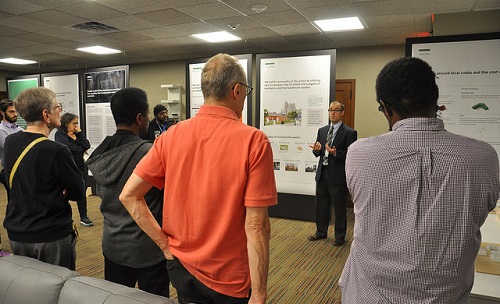 Dr. William Walsh explaining the planning process for the Envision Community concept
Dr. William Walsh explaining the planning process for the Envision Community concept
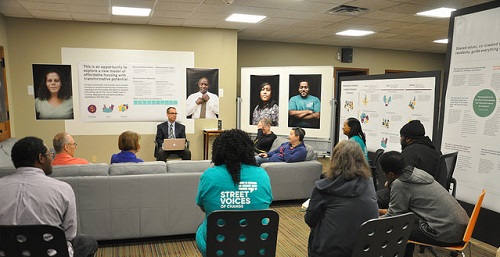 Dr. Walsh conducting a recent collaboration meeting
Dr. Walsh conducting a recent collaboration meeting
A collaborative group, including Upstream Health Innovations, started to work on ways for the healthcare system to participate in housing. This work was guided by Street Voices members, the true experts in the situation of homelessness who wanted to create viable housing for themselves and others experiencing housing instability. They called their initiative “Envision Community.”
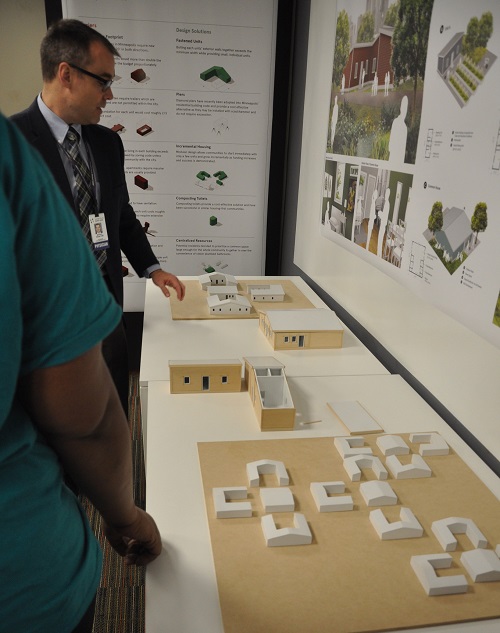 Architectural models of the 'tiny house' pods
Architectural models of the 'tiny house' pods
The population goals are to house a diverse community from across the housing stability spectrum. Envision is designed to include 20% chronically homeless who are the highest utilizers of healthcare, 20% people who have never experienced homelessness and would choose to live in this community, and 60% people who are experiencing homelessness and are not high healthcare utilizers.
During the design process, the collaborative recognized that housing alone is not enough. An accepting, flexible community is essential to create stability and belonging for people who become housed. This is what converts a house into a home. Without this, many people return to the streets seeking freedom and friendship. Because of the importance of community, Envision functions as an intentional community, sharing common values with the intention to live out those values on a daily basis.
It took a broad community to develop this concept. Key collaborators like the Minnesota Design Center, Alchemy Architects and the Minneapolis Public Housing Authority, assisted the Street Voices members by adding their industry-specific knowledge to help turn the Street Voices members’ needs, desires, and experience of what works into a viable solution. The United Health Foundation, the McKnight Foundation’s Region and Communities Program, Julia Dayton, and the Dayton Hudson endowment at the Minnesota Design Center generously funded portions of the project.
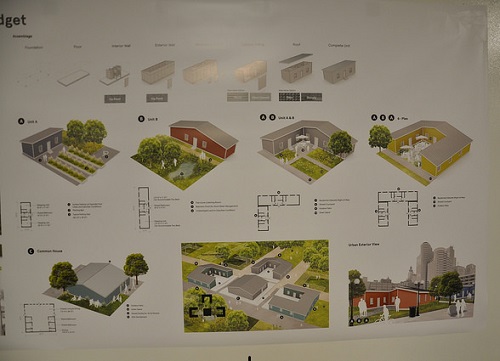 Drawings of the planned community
Drawings of the planned community
- - - - - - - - - - - - - - - - - - - - - - - - - - - - -
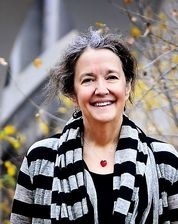 About Claudia Kittock
About Claudia Kittock
Editor's Note: The Star Tribune also ran an article on this topic: http://www.startribune.com/a-village-of-mini-houses-for-the-poor-and-homeless-proposed-in-minneapolis/499730811/
